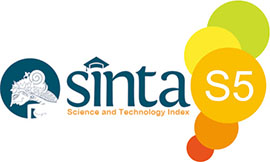PENGARUH PENERAPAN MODEL PEMBELAJARAN KOOPERATIF TIPE QUESTION STUDENT HAVE
 ), Rayendra Rayendra(2),
), Rayendra Rayendra(2), (1) Universitas Negeri Padang
(2)
 Corresponding Author
Corresponding Author
DOI : https://doi.org/10.24036/et.v10i1.119319
Full Text:
 Language : id
Language : id
Abstract
The background of this research is the reality found in the field, namely at SMP Negeri 12 Padang, that the lack of motivation and concentration of students in learning, only some students dare to ask questions or express opinions in class, while other students only accept what is given by the teacher. Researchers see the conventional way of teaching teachers, where learning is only centered on the teacher, especially in social studies lessons, teachers are only motivated by textbooks, students only listen and take notes, at the end of learning students answer LKS, so there are still many class VII students who get results. low learning. To overcome this problem, one alternative that can be applied is to use a cooperative learning model of the Question Student Have type. This study uses a quantitative approach in the form of a quasi experiment. The population of the study was class VII students. The sampling technique was purposive sampling, namely class VII1 and VII3. The data collection technique used a test, in the form of objective questions and the data collection tool was a test question sheet. The data is processed by test (t-test). The results of the study obtained that the average value of the experimental group was 80.16, while the control group was 66.72. From the analysis of the t-test = 4.905 > t table = 2,000, at a significance of 0.05. There is a significant difference in student learning outcomes. It is concluded that the application of the Question Student Have Cooperative learning model has a high effect on student learning outcomes in social studies subjects.
Keywords: Question Student Have; Learning outcomes; IPS.
References
Agusfidar Nasution dan Zelhendri Zen. 2010. Prinsip-Prinsip Dan Penilaian Hasil Penelitian. Padang. UNP
Melvin L.Silberman. 2006. Active Learning. Yogyakarta: Insan Madani.
Mohammad Nasir. 2009. Metode Penelitian. Jakarta: Ghalia Indonesia.
Rusman. 2012. Model-model Pembelajaran : mengembangkan profesionalisme guru. Jakarta: Rajawali Press.
Sintya Pujiastuti. 2008. Pentingnya Pertanyaan dalam Proses Pembelajaran. http://www.sd-binatalenta.com/arsipartikel/artikel_tya.pdf diakses tanggal 29 Mei 2014 jam 14.00
Syaiful Bahri Djamarah. 2010. Guru dan Anak Didik Dalam Interaksi Edukatif: Suatu Pendekatan Teoretis Psikologis. Jakarta: Rineka Cipta.
Trianto. 2011. Pengantar Penelitian Pendidikan Bagi Pengembangan Profesi Pendidikan Dan Tenaga Kependidikan. Jakarta: Kencana.
Zainal Arifin. 2012. Konsep dan Model Pengembangan Kurikulum. Bandung: PT Remaja Rosdakarya.
Zuleha Siregar. 2010. Model Pembelajaran Question Student Have. http://lehawir.blogspot.com/2010/10/berbagi-ilmu-proposal-question students.html. diakses 09 Mei 2014 jam 16.30
 Article Metrics
Article Metrics
 Abstract Views : 287 times
Abstract Views : 287 times
 PDF (Bahasa Indonesia) Downloaded : 64 times
PDF (Bahasa Indonesia) Downloaded : 64 times
Refbacks
- There are currently no refbacks.





